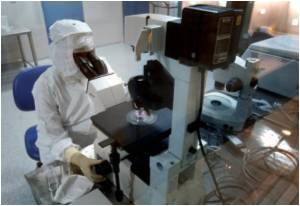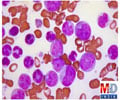
Reich explained that tagging is a way of reading DNA at the cellular level. This falls within an area of study called epigenetics, a process that occurs "on top" of genetics. Each person has approximately 200 types of cells, all with the same DNA, and these must be controlled in different ways. "There is an enzyme –– a protein –– that tags DNA and controls which of the genes in your cells, your DNA, gets turned on and off," said Reich. "So you have 20,000 genes, and you have to control them differently in your brain than in your liver."
Reich explained that there is current interest in this broader field of epigenetics as a direction for the treatment of cancer. "There's definitely the idea that this may be a new way of developing therapeutics, because you don't have to kill the cancer cell," said Reich. "Almost every cancer therapy that's out there works on the principle that a cancer cell needs to be killed."
With epigenetics, instead of only having DNA sequence coding for certain genes, there is an epigenetic process, with another layer of information on top of the genetic process. In this case, that information is the tagging by the methyl groups.
Source-Eurekalert














